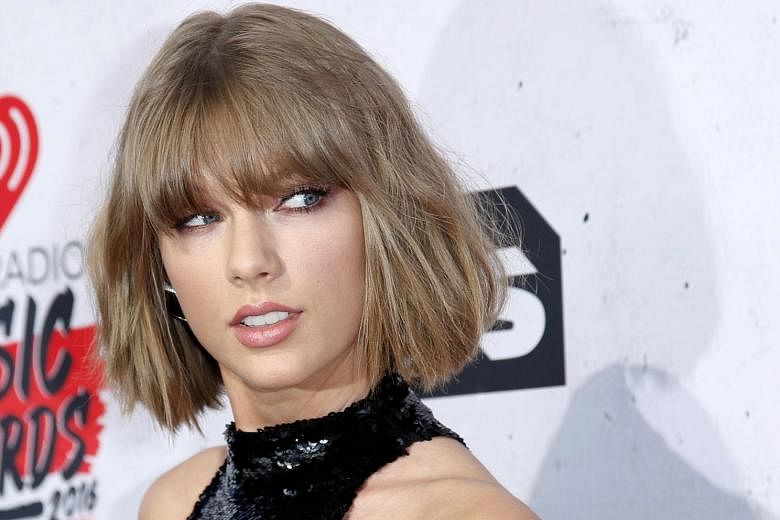NEW YORK (WASHINGTON POST) - Taylor Swift was featured on Time's Person of the Year cover on Wednesday (Dec 6), as one of 2017's "silence breakers" who spoke out during this year's cultural reckoning surrounding sexual harassment and abuse.
At first, some may have been confused to see Swift - a famously apolitical celebrity who has been criticised for not taking any political stance in this divisive year - categorised as one of "the voices that launched a movement," as the magazine put it.
She stood next to figures such as Ashley Judd, one of the first stars who went on the record with allegations against Hollywood mogul Harvey Weinstein, and lobbyist Adama Iwu, who helped coordinate a campaign to stop harassment in California state politics.
However, while Swift spent most of 2017 under the radar until she dropped a new album this month, she made one very notable appearance in August when she showed up in a Denver courtroom.
Two years earlier, former Denver country radio DJ David Mueller had sued Swift, alleging the pop star got him fired when she said that he lifted her skirt and groped her during a meet-and-greet at a 2013 concert. Swift countersued for a symbolic US$1, accusing Mueller of assault and battery.
The jury sided with Swift. (Mueller still denies any wrongdoing and says he might file an appeal.)
The case received worldwide attention - but the most-discussed aspect of the trial was Swift's very blunt testimony, as Mueller's lawyer, Gabe McFarland, questioned her on the stand about whether the DJ actually groped her.
"Gabe, this is a photo of him with his hand up my skirt - with his hand on my a**," Swift said. "You can ask me a million questions. I'm never going to say anything different. I never have said anything different."
When McFarland asked if Swift was critical of her bodyguard for not interfering if Mueller really reached under her skirt, Swift responded, "I'm critical of your client sticking his hand under my skirt and grabbing my a**."
Swift repeatedly reiterated the same point: "He stayed attached to my bare a**-cheek as I lurched away from him."
"He had a handful of my a**. I know it was him."
Time wrote that Swift's "clear-eyed testimony marked one of several major milestones in the conversation around sexual harassment this year."
In the weekend following the trial, the Rape, Abuse and Incest National Network (Rainn) reported a 35 per cent increase for its national hotline.
Rainn president Scott Berkowitz told ABC News that Swift's case was "a great demonstration to other victims that there is strength in coming forward and pursing justice."
In a written Q&A with Time, Swift explained why she spoke so directly to Mueller.
"I had already been in court all week and had to watch this man's attorney bully, badger and harass my team including my mother over inane details and ridiculous minutiae, accusing them, and me, of lying," Swift wrote.
"I was angry. In that moment, I decided to forego any courtroom formalities and just answer the questions the way it happened. This man hadn't considered any formalities when he assaulted me, and his lawyer didn't hold back on my mom - why should I be polite?"
She added, "I'm told it was the most amount of times the word 'a**' has ever been said in Colorado Federal Court."
Swift, who called the trial process "demoralising," said that many people didn't realise that Mueller had sued her first.
"I spent two years reading headlines referring to it as 'The Taylor Swift Butt Grab Case' with Internet trolls making a joke about what happened to me," she wrote. "There was an audible gasp in the courtroom when I was named as the defendant."
Ultimately, Swift said, she received lots of support during the trial, and left with this advice for those who are going through something similar: "You should not be blamed for waiting 15 minutes or 15 days or 15 years to report sexual assault or harassment, or for the outcome of what happens to a person after he or she makes the choice to sexually harass or assault you."
Swift acknowledged that although she recognises her privilege (and her financial means to support an expensive trial) it was still a "lonely and draining experience, even when you win."
After everything, Swift added, she still hasn't received the symbolic dollar that she won from Mueller.
"I think that act of defiance is symbolic in itself," she wrote.

